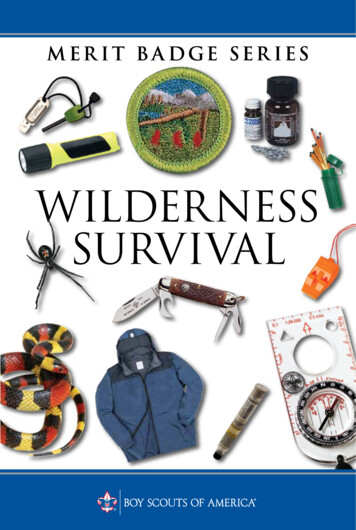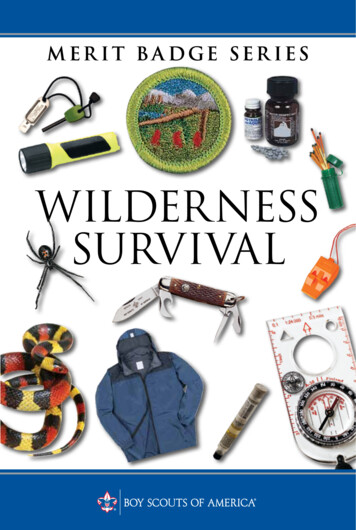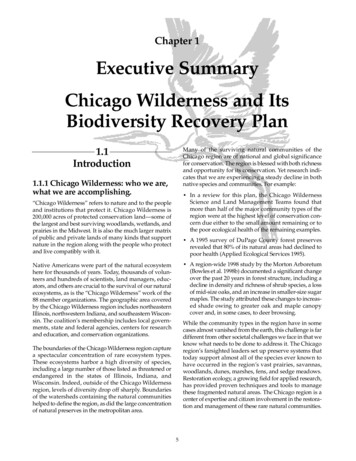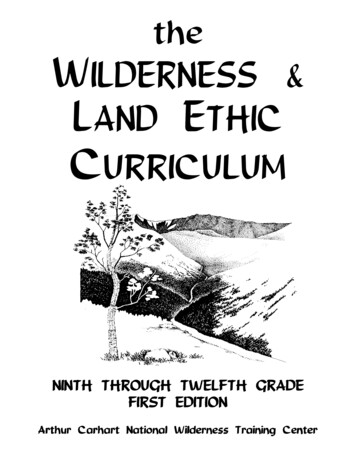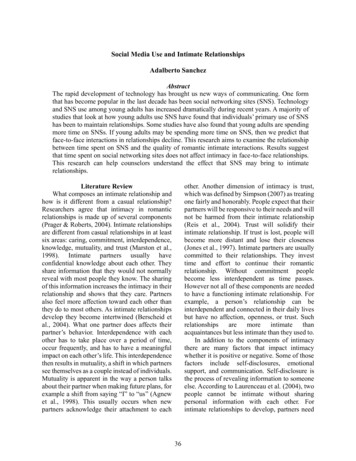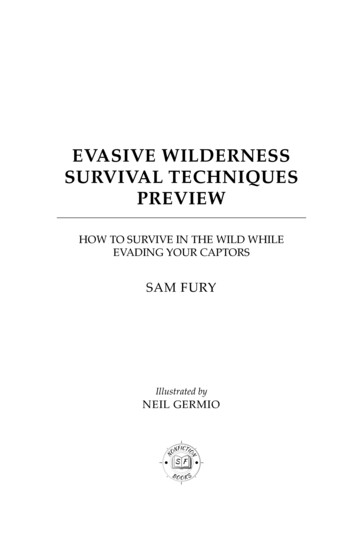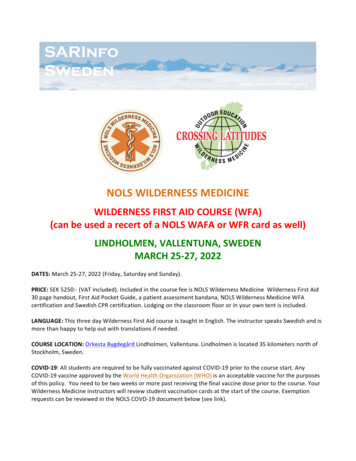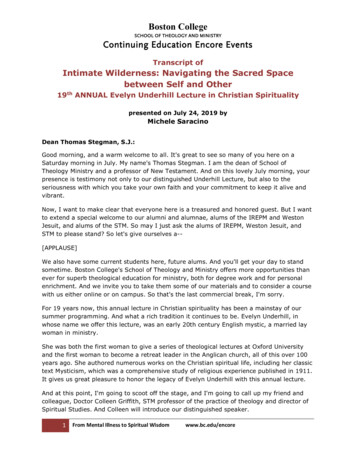
Transcription
Boston CollegeSCHOOL OF THEOLOGY AND MINISTRYContinuing Education Encore EventsTranscript ofIntimate Wilderness: Navigating the Sacred Spacebetween Self and Other19th ANNUAL Evelyn Underhill Lecture in Christian Spiritualitypresented on July 24, 2019 byMichele SaracinoDean Thomas Stegman, S.J.:Good morning, and a warm welcome to all. It's great to see so many of you here on aSaturday morning in July. My name's Thomas Stegman. I am the dean of School ofTheology Ministry and a professor of New Testament. And on this lovely July morning, yourpresence is testimony not only to our distinguished Underhill Lecture, but also to theseriousness with which you take your own faith and your commitment to keep it alive andvibrant.Now, I want to make clear that everyone here is a treasured and honored guest. But I wantto extend a special welcome to our alumni and alumnae, alums of the IREPM and WestonJesuit, and alums of the STM. So may I just ask the alums of IREPM, Weston Jesuit, andSTM to please stand? So let's give ourselves a-[APPLAUSE]We also have some current students here, future alums. And you'll get your day to standsometime. Boston College's School of Theology and Ministry offers more opportunities thanever for superb theological education for ministry, both for degree work and for personalenrichment. And we invite you to take them some of our materials and to consider a coursewith us either online or on campus. So that's the last commercial break, I'm sorry.For 19 years now, this annual lecture in Christian spirituality has been a mainstay of oursummer programming. And what a rich tradition it continues to be. Evelyn Underhill, inwhose name we offer this lecture, was an early 20th century English mystic, a married laywoman in ministry.She was both the first woman to give a series of theological lectures at Oxford Universityand the first woman to become a retreat leader in the Anglican church, all of this over 100years ago. She authored numerous works on the Christian spiritual life, including her classictext Mysticism, which was a comprehensive study of religious experience published in 1911.It gives us great pleasure to honor the legacy of Evelyn Underhill with this annual lecture.And at this point, I'm going to scoot off the stage, and I'm going to call up my friend andcolleague, Doctor Colleen Griffith, STM professor of the practice of theology and director ofSpiritual Studies. And Colleen will introduce our distinguished speaker.1From Mental Illness to Spiritual Wisdomwww.bc.edu/encore
Boston College[APPLAUSE]Dr. Colleen M. Griffith:Good morning, everybody. So it's a great pleasure to welcome Michele Saracino to BostonCollege as the 2019 Underhill lecturer. In her teaching and her scholarship, MicheleSaracino, like Evelyn Underhill, remains focused on what it means for us to be truly human,human selves in a changing world and a changing church.And like the early 20th century spiritual giant Underhill, Saracino invites markedattentiveness to the affective dimensions of personhood, which can impede or serve aspowerful resources when facing the challenges the deeper personal and relationalengagement in a fragmented world pose. Saracino offers valuable insight into the humancondition, our anxiety about finitude, our frailty and vulnerability in relationship, andespecially the emotional dissonance we experience in our encounters with difference.Her theological anthropology points in the direction of actual practices by which thesedimensions of being human get navigated. Blending theology and spirituality in waysdescribed by commentators as both, quote, "pastorally sensitive and psychologicallyastute." Saracino's voice is a commanding one, inviting us all to greater reflective affectivityin relationship to self, God, and other.Doctor Saracino is professor of religious studies at Manhattan College in Riverdale, NewYork. She works in an interdisciplinary fashion at the intersections of theologicalanthropology, spirituality, contemporary continental theory, and psychologies of the self.Saracino is the author of four books, including the title Christian Anthropology: AnIntroduction to the Human Person, published in 2015, and Being About Borders: A ChristianAnthropology of Difference, which was awarded first place in theology in 2012 by theAssociation of Catholic Publishers. Most recently, Michele has coedited a volume dedicatedto the work of Boston College's own professor Shawn Copeland, entitled EnfleshingTheology: Embodiment, Discipleship, and Politics in the Work of M. Shawn Copeland.This morning, she will present "Intimate Wilderness: Navigating the Sacred Space BetweenSelf and Other." Please join me in welcoming to the stage Professor Michele Saracino.[APPLAUSE]Professor Michele Saracino:Good morning, everyone. Thank you for being here on this beautiful summer day. I'm sopleased to be with you and honored to be presenting the Evelyn Underhill Lecture inChristian Spirituality. Having done a bit of reading on Evelyn Underhill, I've become inspiredby her work. She's challenged many to live in new ways with an openness to God andothers.Before I begin, I would like to thank the Boston College School of Theology and Ministry forhaving me, as well as Professor Jane Regan and Miss Melinda Donovan, who is not here, formaking all the fine arrangements. For Mr. George Cooke for helping me out with all the techtoday and the theater setup.2From Mental Illness to Spiritual Wisdomwww.bc.edu/encore
Boston CollegeAnd I'd also like to offer a few words of gratitude for Dr. Colleen Griffith. We've shared acollegial friendship throughout the years, connecting at conferences. And I appreciate hersupport and contributions to the field. So thank you. And I will begin.If you've ever taken a nature walk, you know with even the right preparation-- a map inhand, proper hiking shoes-- that things could go awry. A storm could suddenly manifest.The path could muddy. Downed trees could block your route. More than usual brush couldscrape your ankles. Or a swarm of insects could nip at your neck.In an instant, the wild becomes unsettling. That's when we're called to exert extra attentionas not to get hurt. Strategies are necessary for us to survive and flourish in the wild.We also must be strategic in order to preserve the beauty and bounty and gifts of the wild.We have learned this from experts in the field-- from scientists, naturalists,conservationists-- who, for the larger part of the 20th century and, of course, for the 21stcentury in this age of climate change and environmental degradation, have shown that ourprevious ways of navigating all that is wild has resulted in disaster.Instead of respecting the wild, in many cases, humans have engaged the wild as somethingto be dominated, used, and controlled. Species are dying out. Storms are raging. Life as weknow it is regressing.Aldo Leopold, an American conservationist, scientist, and author of A Sand County Almanac,who lived and worked in the early 20th century, commented on the human misuse of thewild. He provided a critique which carries into today. For Leopold, quote, "the ability to seethe cultural value of wilderness boils down to a question of intellectual humility," end quote.Demonstrating intellectual humility requires admitting that we don't know everything aboutthe natural world, and consequently, we need to approach the wild with a willingness andcommitment to learn from the other. It's easy to blame individuals for not respecting naturebecause they're greedy. And in some cases, this is true. The desire for profit trumps careand concern for the planet.Yet the manipulation of the natural world is not only a result of greed, but also the collateraldamage of fear. We fear much of what is different from us. And we deal with this fear bydeluding ourselves into imagining a wild place or another creature as familiar, even makingthe other into something familiar or someone familiar through force. In dire situations, soriddled by fear of the other, we avoid them. Or even worse, we annihilate them.Whatever reasons for our lack of humility toward the wild, it is perishing, and so are we.Researchers implore us to change our attitude toward the natural world and reconsider ourplace in it.What if we applied these sober lessons to our everyday lives? What if we framedinterpersonal relationships, like our forays into forests, oceans, deserts, as unknown,mysterious, and sacred places that demand our intellectual humility?My presentation today frames emotional openness to others through the lens of the wild asbeing thrust into undomesticated and unmanageable territory. My hope is that if we use the3From Mental Illness to Spiritual Wisdomwww.bc.edu/encore
Boston Collegesame strategies in our interpersonal relationships as we ought to use in the wild, we can setthe stage for developing more robust, more empathetic relationships with all others in ourmidst.For some, conceptualizing interpersonal space as the wilderness may seem like a bit of astretch. How is relating to one's partner or child or colleague analogous to being thrown intothe wilderness?Here's how I'm making the comparison. Similar to the way humans have manipulated anddomesticated nature for their own use and out of their own fear, individuals can fall into thetrap of domesticating the other in interpersonal relationships, or avoiding them altogetherbecause of ignorance or fear. Moreover, if making the other familiar or avoiding themdoesn't work, then, much like the human disregard for the natural world, we could betempted to try to eradicate the other completely.In an effort to overcome the temptation to domesticate and control others in our lives,today I'm suggesting three strategies for navigating interpersonal relationships. The first isto engage all encounters and relationships as mysterious places where we are challenged tolet go of all our assumptions and fears about the other and just be present with them.There, in the presence of the other, we might first observe what is unfolding instead ofassuming this or that.Second, if what we sense in the presence of the other is different than what we hadoriginally presumed to be the case, then we are obliged to change our mind, heart, and will- in other words, improvise in the face of the other.For the third strategy, we're called to let go of a false or fixed sense of self in order toaccommodate the unpredictability of the wilderness. Adjusting our frame from thinkingabout interpersonal relationships as entities we can and should manage to wild places wherewe observe, improvise, and let go makes room for even more robust relationships in ourlives, ones sustained by empathy and courage.This is an outline of my presentation. First I begin by posing the problem of why I believeit's necessary to discuss interpersonal relationships in the first place.This problem is neither universal nor the same for everyone. However, I'm going to go outon a limb and say that many of us are dealing with pervasive feelings of emptiness andhave less-than-robust relationships in our lives. And if we don't, we have friends who feelthis way. It's my hope by reframing these less-than-robust relationships as moments in thewild that we will become energized to cultivate more fulfilling interpersonal connections.Next in the presentation, I define "wild," and then I explore wilderness as a symbol inscripture, theology, and psychology.In the fourth section, I detail the strategies that I just mentioned for engaging the wild. Andthey are observing, improvising, and letting go. Many of us enact these strategies in otherparts of our lives, even in everyday embodied activities.4From Mental Illness to Spiritual Wisdomwww.bc.edu/encore
Boston CollegeAnd so in the following section, I turn to swimming as an activity that lends itself to thewilderness experience. With any luck, as I discuss my passion for swimming, you all willthink of embodied activities in your lives that work similarly.Finally, in the last section, I suggest that embracing the wild and interpersonal relationshipsis a way to support our spiritual and biological drives for connection, fostering empathy inour lives. "Empathy" is a popular term these days. Empathy as I understand it-- becausethere's lots of different definitions-- is an emotional or intellectual connection with another,and it can be both.It is that which orients us toward robust relationships and helps us to learn from them andgrow. Some hope-- at least in some of the literature-- we see that perhaps beingempathetic on the global landscape has the potential to bridge religious, political, and thecultural divides that seem to permeate our world. My aim today is far more modest. It issimply to provide a way for talking about the complexity of relating to one another so thatwe can inhabit relationships with others-- human, non-human, and the divine-- that are alittle less lonely and a little more fulfilling.So why wilderness? Why intimacy? What's the problem here? Truth be told, I found thatspeaking publicly about feelings of emptiness, isolation, and loneliness is a bit taboo.Admitting one is feeling empty and lonely can be a deeply shameful action. If you want tomake someone feel small, just tell them they look lonesome. It's like they've been caughtdoing something wrong. We could speak about it in terms of the infirm or the elderly. Butfor many others, even uttering the words "lonely" or "loneliness" is terrifying.Discussing intimacy is no less fraught. Intimacy is often associated with sexualrelationships, which are not excluded here, still not the main focus. Indeed, anyinterpersonal relationship has the potential to be intimate, if what we mean by "intimate" isone of deep connection, full of energy, and, quite simply, robust.The desire to overcome loneliness and inhabit relationships of intimacy accompanies us atevery stage of our lives. At least it has for me. When I was a child, there were times when Ithought no one understood me. When I was an undergraduate in college, I thought therewas something wrong with me for missing home and missing family, when everyone else onthe quadrangle seemed to be having a great time playing frisbee and sunbathing.When I was a graduate student, I doubted I would ever find someone with whom I canshare ideas. When I became a parent, I was at a loss for describing the dead space betweenfeedings and playdates, and now the lulls between driving my children here and there.Loneliness has accompanied me through every stage.Perhaps some of you in this audience this morning experience these feelings to variousdegrees. Although talking about them is uncomfortable, the last thing we need is lessconversation on this. Loneliness is pervasive, damaging to the human spirit, and evendeadly.I hear about their loneliness when my students come into my office and talk about theirlives. I see their feelings of emptiness when they write about vulnerability in their journals.5From Mental Illness to Spiritual Wisdomwww.bc.edu/encore
Boston CollegeI detect loneliness in my friends at the gym and in my neighborhood as they search forconnections any way they can. It may be the case that loneliness is too dramatic a word.Another way of thinking about the situation is that some of us feel empty from less-thanrobust relationships and less-than-robust situations. These less-than-robust relationshipsare connections we have with others that could be so much more fuller, more life giving ifwe had the tools, energies, and resources to develop them.You may wonder how we got here to so much emptiness. The etiology of less-than-robustrelationships is multifactorial. Sometimes we block others from making connections, and attimes we prevent ourselves from developing rich relationships. Particular lifestyles lendthemselves to isolation. For instance, with that of the homebound individual or the newmother, just to give a couple of examples.Additionally, an individual may be lonely because they have been hurt what feels like onetoo many times. And then there is the very serious loneliness complicated by electronictechnology.To be sure, we have the capability to connect with individuals in ways that wereunimaginable 50 years ago. Nevertheless, if we would like to deepen those relationships andcreate intimacy that is genuine and courageous, we probably need to work on them beyondour devices. And if that work isn't done, then those electronic connections may exacerbatefeelings of loneliness.A final cause for less-than-robust relationships and probably the most important for ourdiscussion today, is the common-sense view that human beings are innately competitiveand just not plain interested in being enmeshed with others. This idea has permeated muchof Western capitalist ideology, which took root in social Darwinism. It leads us to believethat if we do, in fact, desire connections with others, there is something wrong with us,we're too needy, we're broken, and we're less than.However, nurture and nature point a very different portrait, one in which desire forconnections is a non-negotiable aspect of creaturely experience. Looking at the HebrewScriptures, we find that we're created for others, to be in community with others-- nonhumans, humans, and the divine.Loneliness is not an optimum, ideal, or divinely ordered situation, so much so that in thecreation myth of Genesis 2, we encounter a snapshot of the divine who attends tohumanity's loneliness by creating connections for them. God doesn't want humans to bealone. Companionship is part of God's plan. Sociality is part of our destiny, and genuinefreedom and flourishing depends on our engagement with others.Moreover, Jesus in the Gospels is other oriented, creating community and buildingrelationships on care. He uses touch as a way to connect with others. He invites thedespised into the community. He eats with tax collectors.He reluctantly negotiates with Syrophoenician woman, who is an other three times over.She is a woman, she is a foreigner, and she is a Gentile. And she begs him to cast the6From Mental Illness to Spiritual Wisdomwww.bc.edu/encore
Boston Collegedemons out of her daughter. After first denying her request, he's moved by this persistentmother's retort. And her daughter is healed.The Gospels are certainly rife with examples of Jesus's other-oriented activity and his drivefor connections, if you will. Less transparent is the way that Jesus negotiated theseemotionally charged situations.We don't get a lot of information from the Gospels about how he felt in these intimateencounters with others, and what he did to overcome any feelings-- negative feelings-- thatemerged in those encounters, like anger and fear. Was he afraid of losing status when heassociated with the downtrodden? Was he angry at that Syrophoenician woman for callinghim out on his bias?Was he repulsed by the skin sores and blood of the sick? If so, how did he work through thisemotional baggage? Did he have to let go of the desire for status in order to truly connectwith others? While Christians certainly have biblical examples of building robustrelationships with others, scaffolding is necessary for managing the emotional work involvedin the building. Put simply, strategies are needed to be empathic.Before moving on to the strategizing, it's important to note-- I think in today's day, right-that in addition to the spiritual need for connections, we have a biological drive forconnection as well. Since the 1990s, researchers have affirmed the reality of mirrorneurons, which wire us for empathy. Mirror neurons fire up both when we experiencesomething, such as pain, and also when we see someone else going through a painfulexperience.People with lots of mirror cells tend to be more empathic, especially in terms of sharingemotions. Scientists believe that the discovery of mirror neurons in the 1990s can becompared to the Crick and Watson's double-helix revelation, leading some to believe thatmirror neurons will do for psychology what DNA did for biology.To be sure, both nurture and nature are at work in our desire for connection. That's notbeing contested here. What is being suggested is that navigating this predisposition takeswork and strategizing.For me, it's like working out. We generally don't drag ourselves out of bed every day,enduring these elongated workouts or strenuous cardio things, for nothing. We havemuscles, and they will atrophy if we don't maintain and strengthen them. Similarly, thespiritual desire and biological hard-wiring for connection is there. Still, we need to enhancethose skills and build our empathy muscles in order to create more robust relationships inour lives.So now that you have a sense of what I gauge the problem to be-- less-than-robustrelationships amid the spiritual and biological hunger for them-- let's return to the lens ofwilderness and consider what makes something wild and what constitutes wilderness. Forme, any creature, entity, place, or event that is foreign to us is in some way wild. Yet not allwild places are the same. Some are pleasing, some are bothersome; sometimes they'reboth.7From Mental Illness to Spiritual Wisdomwww.bc.edu/encore
Boston CollegeI like to think of wild places in the words of Diane Ackerman, a well-known author andnaturalist. She describes them as sacred, quote, "holy places. They keep us secluded,sprung loose from reality, separated from life's routines," end quote. They are holy becausethey draw us out of ourselves and ask us to connect with otherness in mysterious andcourageous ways.So if you take a look at these images, I think they're beautiful. And one is the Ganges River.One's the Redwood Forest. And one's the Great Barrier Reef. And of course, they don't dojustice. It's just to try to get your imagination going here.Perhaps some of you have visited these beautiful, sacred sites. If not, just looking at themhas the potential to invoke something in us. They arouse us. They stimulate our senses andcan even inspire us to be better versions of ourselves.Yet with all the delight they bring to our senses, we should never become too comfortablenor too complacent when in their company. Unforeseeable happenings can unfold. Andforeign creatures can pop out out of nowhere. It's in our best interest to proceed withcaution and care.These amazing places are easily seen as wild. Nonetheless, wilderness is not something wehave to look for. We don't have to travel anywhere to find it. Rather, it's in everyinterpersonal relationship in which we find ourselves. It's the space between romanticpartners, colleagues, friends, acquaintances, political rivals, human and non-human,creature and creator. Intimate wilderness is the sacred space between self and other inwhich we are called to observe, improvise, and even mourn.As you probably have guessed, the notion of wilderness has symbolic value. In the Gospelof Matthew, we have a story about Jesus fasting for 40 days and nights in the wilderness.He's tested, if you will, to see if he can survive temptation and not give in to evil. Heprevails,and like Jesus, Christians are called to traverse the wilderness in their own lives. Ourwilderness is not the desert, per se, but a type of wilderness experience in which living withothers presents as a long journey for us to say yes to good and yes to God.Think about your most taxing relationship, perhaps with a partner, a child, your boss, anemployee, a parent. Sometimes individuals feel like they should have it all together. Andwhen things go wrong, bad things happen, uncomfortable situations arise. There is oftenpanic and denial.Instead of thinking we should have it all together, could we envision ourselves as embarkingon a journey into the unknown, where we'll be faced with challenges and queries and tests?We may not know what the other wants, and that probably scares us, so we'd rather leavethan stay. Or it may be the case that we're too frightened to express what we want, so we'drather leave.Interpersonal wilderness is a place where uncertainty and sacred vulnerability abound, andit's our job to find a way to reside in this wilderness. A good place to start is by observingthe situation and paying attention to the other.8From Mental Illness to Spiritual Wisdomwww.bc.edu/encore
Boston CollegeSimone Weil, a French philosopher who lived in the early 20th century, wrote about theimportance of attention. For Weil, being attentive is, quote, "the purest form of generosity,"end quote. This idea makes me pause because to pay attention in critical momentsdemands commitment and care, important aspects of any relationship. To observe is noteasy. It's an arduous practice and a concrete way of being for the other in the wilderness.In addition to being attentive or observing in the wilderness, we need to be ready toimprovise in the face of otherness. We see the importance of improvisation as a survivalstrategy in the work of the womanist theologian Dolores Williams. In her groundbreakingChristian theological book entitled Sisters in the Wilderness, Williams discusses how womenof color are not all that different from the slave woman Hagar in the book of Genesis.Some of you may recall that according to Scripture, Hagar was forced to flee her mastersSarah and Abraham, only to find herself alone in the wilderness with her son Ishmael. LikeHagar, women of color experience wilderness in the concrete. And for Williams, this unfoldsas, quote, "a near-destruction situation in which God gives personal directions to thebeliever and thereby helps her make a way out of what she thought was no way," endquote.Simply put, for Williams, women of color are called to improvise in the wilderness. Thesignificance of the wilderness in the imaginations of enslaved and contemporary AfricanAmerican communities is striking, so much so that in the spirituals, for example, which aresongs of resistance to slavery and oppression, wilderness represents a sacred space wheregrace abounds. God meets creation in the wilderness.In the opera of our everyday life, each one of us is called to improvise in the wilderness. Inher work entitled Composing a Life, Mary Catherine Bateson, who's Margaret Mead'sdaughter but a writer and cultural anthropologist in her own right, discusses the power ofimprovisation. And I really recommend this-- Composing a Life and all her books-- if you'venever read them.Bateson surmises that many of us feel overwhelmed by everything that's going on in ourlives, whether it's at home or school or work. And many of us know this feeling. And forBateson, we often feel as if we have to juggle it all. That's her metaphor-- juggling it all.And we have to at least pretend we can juggle it all so we are lovable. We're lovable. Wecan handle everything. We got it under control.From Bateson's perspective, this juggling act keeps us from leading a flourishing life. So asan alternative, she asks her readers to engage the fluidity of life in a metaphor of theyshould compose their life. Composing involves being attentive to what's going on, like wasalready mentioned, and also being open to change.Going with the flow is one way of talking about improvisation. But it's not an uncaring aboutwhat's happening. On the contrary, it's because we have an investment in the relationshipor the matrix of relationships that we give ourselves permission to change our mind, heart,and will in the presence of the other.9From Mental Illness to Spiritual Wisdomwww.bc.edu/encore
Boston CollegeIn a fortunate stroke of serendipity, when I was reading up on Evelyn Underhill, I found thather Practical Mysticism book was really important to this conversation. And she, too, upheldthe notion of self that was open to change, or what I've been calling "improvisational."Underhill writes about the, quote, "surface self who exchanges freedom for a parent'ssecurity, who resides in a defensive shell of fixed ideas and of old habits, old notions, andprejudices," end quote.For Underhill, in order to engage in practical mysticism, we have to, quote-- this is herwords-- "change our attention"-- so we have to observe-- "and then next the deliberaterearrangement of one's ideas, energies, and desires in harmony with that which they haveseen." This echoes what has already been said here-- that we have a need to observe in thewilderness and improvise in relationship to new information.There's one last thread I'd like to introduce in this discussion of wilderness as symbol, andthat's namely the work of Brené Brown. You may know her, she's very popular now, andshe's a well-known clinician and researcher in the areas of shame, empathy, andvulnerability.She explains wilderness as an untamed, unpredictable place of solitude and searching. Shewrites, quote, "the wilderness can often feel unholy because we can't control it. But it turnsout to be a place of true belonging. And it's the bravest and most sacred place you will everstand," end quote.Brown presents us with a picture of psychological wilderness that we are not to avoid but, infact, we should seek in order for true freedom to emerge. The wilderness space betweenmyself and the other is the spark, the conduit, the fuel for my freedom. Freedom emergesin opening to others. Hence without a connection, I'm not free; I'm isolated, alone, and cutoff. I have less-than-robust relationships.What all these voices show, from Scripture to mysticism to theology to anthropology topsychology, is that in seeking the wilderness, we need to observe, improvise, and relinquisha static sense of self. I think this is what Underhill means in her assertion that each one ofus at any time may be called to make an adjustment of the self.Self-adjustment culminates in letting go and mourning one's own former self. And mourningis significant here because without recognizing the loss we face when we give upuncertainty in the face of the other, we cannot move toward more ro
Anthropology of Difference, which was awarded first place in theology in 2012 by the Association of Catholic Publishers. Most recently, Michele has coedited a volume dedicated to the work of Boston College's own professor Shawn Copeland, entitled Enfleshing Theology: Embodiment, Discipleship, and Politics in the Work of M. Shawn Copeland.
